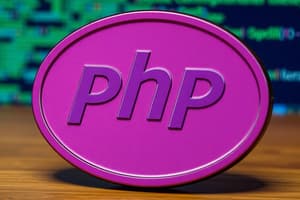Podcast
Questions and Answers
What was the primary motivation behind Rasmus Lerdorf's development of PHP?
What was the primary motivation behind Rasmus Lerdorf's development of PHP?
- To support SQLite databases
- To improve object-oriented programming capabilities
- To create a server-side scripting language
- To count the number of visitors to his online resume (correct)
PHP 6 was released in 2007.
PHP 6 was released in 2007.
False (B)
What does PHP stand for?
What does PHP stand for?
Personal Home Page/Form Interpreter
PHP was initially developed in _______________________ by Rasmus Lerdorf.
PHP was initially developed in _______________________ by Rasmus Lerdorf.
Match the following PHP versions with their corresponding release years:
Match the following PHP versions with their corresponding release years:
What feature was introduced in PHP 5?
What feature was introduced in PHP 5?
PHP code is executed on the client-side.
PHP code is executed on the client-side.
What was the number of users using PHP to enhance their web pages by 1998?
What was the number of users using PHP to enhance their web pages by 1998?
PHP 5 was released on _______________________.
PHP 5 was released on _______________________.
How many domains had PHP installed by 2004?
How many domains had PHP installed by 2004?
Flashcards are hidden until you start studying
Study Notes
PHP Overview
- PHP is a server-side scripting language embedded in HTML.
- It's used to manage dynamic content, databases, session tracking, and even build entire e-commerce sites.
Databases
- PHP is integrated with popular databases such as MySQL, PostgreSQL, Oracle, Sybase, Informix, and Microsoft SQL Server.
- PHP supports a large number of major protocols like POP3, IMAP, and LDAP.
Performance
- PHP is fast in its execution, especially when compiled as an Apache module on Unix.
- The MySQL server executes complex queries with huge result sets in record-setting time.
Syntax and Variables
- PHP syntax is C-Like.
- PHP is a loosely-typed language (no need to explicitly create, typecast, or destroy a variable).
- Variables can be declared using the
$symbol (e.g.,$age,$firstName,$totalSalary,$_myValue, etc.). - Strings can be enclosed in single quotes (') or double quotes (") and concatenated using the dot character (
.). - To display a single quote (
') as a string, use the escape character (\).
File Management
- PHP can create, open, read, write, delete, and close files on the server.
Web Development
- PHP can collect form data, send and receive cookies, and add, delete, or modify data in a database.
- PHP can be used to control user access and encrypt data.
- PHP can output various formats like HTML, images, PDF files, and even Flash movies.
Features
- PHP supports a wide range of platforms (Windows, Linux, Unix, Mac OS X, etc.).
- PHP is compatible with almost all servers used today (Apache, IIS, etc.).
- PHP is free and can be downloaded from the official PHP resource (www.php.net).
- PHP is easy to learn and runs efficiently on the server side.
History
- PHP was developed by Rasmus Lerdorf in 1994/1995 as a PERL/CGI script to track visitors on his online resume.
- PHP 2.0 was released in 1997, and PHP 3.0 followed in 1998.
- PHP 4.0 was released in 1999, and PHP 5.0 was released in 2004.
- PHP 6.0 was planned for release in 2007 but was not released.
Key Categories
- Practicality: PHP is the right language for many applications due to its forgiving nature and versatility.
- Power: PHP has native support for over 25 database products and offers improved object-oriented capabilities.
- Emerging Technologies: PHP supports various emerging technologies like PERL-compatible regular expressions, XML, and web services.
Studying That Suits You
Use AI to generate personalized quizzes and flashcards to suit your learning preferences.




